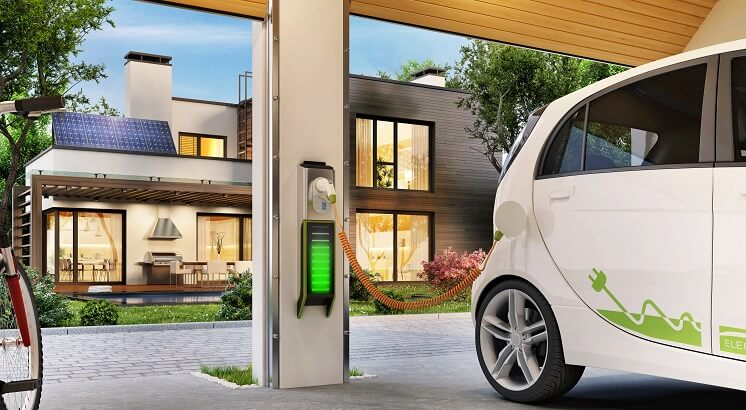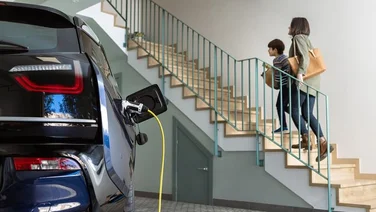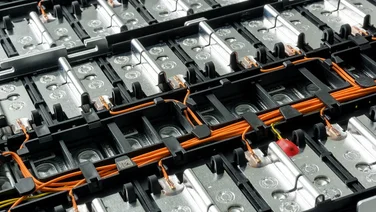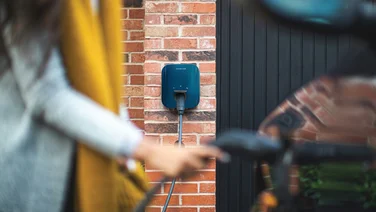We receive a small fee from trusted installers when you request a quote through our site. This helps us keep our content independent, well-researched and up to date – Learn more
- What’s on this page?
- Can solar panels charge an electric car?
- How many solar panels are needed to charge an electric car?
- How long does it take to charge an electric car with solar panels?
- What’s the cost of solar panels to charge an electric car?
- Should you get a solar battery as well?
- Which companies offer solar EV chargers?
- Pros and cons of solar EV charging
- Next steps
- EV charging with solar: FAQs
- Most recent EV charger models are solar compatible
- Between 8–12 solar panels should be enough to fully power an electric vehicle
- Solar panels are rarely used to fully power an EV, but they can top up its charge
After paying the installation costs of an electric charger, you’re also faced with the price of the electricity to charge your car.
You can reduce this with solar panels, leaving you with a smaller carbon footprint and more money in the bank.
But there are several caveats to consider before you start using solar panels to charge your EV, such as the fact that not all EV chargers are solar compatible.
We’ll explain how to charge an EV with solar panels in this article. We’ll also look at costs, which companies offer solar compatible EV chargers, and the pros and cons of solar EV charging.
Before you can hook up solar panels to an EV, you’ll need to get a home EV charger. To speed up the buying process, try using our easy-to-use quote tool. Once we’ve received your details, we’ll pass them on to our suppliers, who’ll be in touch with their best prices.

What’s on this page?
Can solar panels charge an electric car?
Yes, you can use solar panels to charge your electric car. However, most homeowners won’t be able to fully charge their EVs using solar energy.
That’s because there’s a mismatch between when solar panels produce electricity, and when most EV owners charge their cars.
Solar panels produce electricity when the sun is out, during the day. But that’s also when most EV owners are using their cars. At night, when solar panels don’t produce electricity, is when most people charge their cars.
Furthermore, most EV chargers only start using solar-generated energy after the house used all the solar electricity it needs.
This means that, in most cases, the EV charger won’t get a chance to charge the car because the house will have consumed all of the solar energy first.
There are, however, some EV chargers that can take in solar-generated electricity first, ahead of the house. These EV charging stations also tend to be smart chargers, meaning the homeowner just needs to use an app to choose whether they send electricity from the panels to their house or car.
You’ll also need to make sure that your solar panel system can generate enough power to charge your car – which brings us to our next section.
How many solar panels are needed to charge an electric car?
According to Octopus Energy, a solar panel system with around 8–12 panels will usually be able to power an electric vehicle.
But that’s if you’re using the solar panels solely to charge your car, and not to power your house.
If you want to top up an EV using excess solar energy from panels that power your house, you might not be able to fully charge your car using solar energy.
You also need to make sure you have enough solar power leftover in order to do this. So the more solar electricity you use for your home, they less likely it is that you’ll be able to charge your EV with solar energy.
And remember, the larger the EV battery, the more solar panels you’ll typically need to charge it. So it’s important to factor in whether the size of your solar panel system will be able to generate enough power to charge your EV. It’s worth discussing this with a solar panel installer before you crack on with the charger installation.
The number of panels you’ll need to be able to charge an EV will also depend on:
- Your local climate – The panels will be able to generate more energy in a particularly sunny area, compared to somewhere that gets a lot of cloud and rain
- The solar panel efficiency rating – In theory, the more efficient the solar panel, the more electricity it’ll be able to produce
Did you know that cars with integrated solar panels are already a thing? Head to our page to find out more.
How long does it take to charge an electric car with solar panels?
It can take anywhere between 30 minutes and 12 hours to charge an electric car with solar panels. But again, most people won’t be able to completely charge an EV only using solar energy.
The exact amount of time it takes to charge an EV with solar will depend on the size of the battery – the bigger the battery, the longer it’ll take to replenish – and the speed of the charging point.
Although you can’t install rapid chargers at home, there are some pretty speedy options out there for homeowners, generally going up to 7 kilowatts (kW).
Want to compare this to charging an EV without solar panels? Check out our page on How Long Does It Take To Charge An Electric Vehicle?
What’s the cost of solar panels to charge an electric car?
If you want to buy solar panels to charge an electric car, you should expect to pay roughly £7,860 for 10 solar panels, taking up 20m² of roof space.
But bear in mind that the cost of solar panels tends to fluctuate, depending on the type of solar panels you choose, the installer you go for, and your location.
10 solar panels is also the number required to power the average UK home. So depending on what you choose to prioritise, your car or your home, you can use this energy to power both – just not at the same time.
In terms of savings, however, it’s more cost efficient to power your home with electricity from your solar panels than it is to charge your car with it.
Plus, as well as saving on bills, solar panels can also make your home more attractive. 69% of people are likely or very likely to buy or rent a property with solar panels, according to our latest National Home Energy Survey.
Want to learn more about how much solar panels cost up front, as well as how much they can save you? Head to our Solar Panels Cost page.
Should you get a solar battery as well?
If you want to charge your EV with solar panels during the day, then you don’t have to get a solar battery. However if you are charging your EV at night, then a battery is a necessity.
If you’re only usually home in the evenings, for example, charging your EV without a solar battery will be challenging, as your solar panels won’t be able to harness any energy without sunlight.
A solar battery will store surplus electricity generated in the daytime, which can then be used to charge an EV in the evenings.
You can find out everything you need to know about solar batteries on our page: A Beginner’s Guide to Solar Batteries.
Which companies offer solar EV chargers?
There are currently three main companies on the market that supply solar EV chargers: Indra, MyEnergi, and Hypervolt.
Indra
Cost: from £949 including installation (available at up to 75% off with the Office for Zero Emission Vehicles (OZEV) grant)
Charging speed: 7.4 kW
Indra claims that its Smart PRO charger is “the smartest electric vehicle charger available on the market”.
This 7.4 kW home charger can be connected via Wi-Fi, 4G, or ethernet connection, making it easier for users to charge their EVs with solar power.
On top of this, the Smart PRO charger includes all the latest safety features, which means users can avoid cluttering their homes with fuses and cables.
One of the best things about this charging station is that you can pair it with the Indra app, which allows users to create a regular charging schedule and use a boost function for immediate charging. You even have the option to charge in units of miles, kWh, or money.
MyEnergi
Cost: from £779 including installation (get up to 75% off with the OZEV grant)
Charging speed: 7 kW
MyEnergi was the first company to develop a solar EV charger of its kind, revolutionising the EV industry.
Its Zappi charger can be paired with the MyEnergi app to set timers and utilise economy tariffs, and make sure the user is getting the best possible deal. Users can also try the boost function through the app, which triggers the fast charging mode.
The unit comes with three charging modes:
- Eco charging – The eco mode minimises the use of grid power, either taking advantage of cheaper rates overnight or using 100% solar energy
- Eco charging+ – This overlaps a lot with the eco-charging mode, but also has a setting that continuously adjusts the charging power, in response to changes in solar generation or power consumption in the home
- Fast charging – Fast mode charges the vehicle at maximum power, meaning users can have a fully charged car in a last-minute rush
Hypervolt
Cost: from £660 (get up to 75% with the OZEV grant). Installation cost variable
Charging speed: 7 kW
The Hypervolt Home 3.0 charger allows users to track their energy consumption, which can help them understand which times of the day it’s best to consume solar energy.
To make sure the chargers don’t become outdated quickly, Hypervolt units automatically upgrade to the latest software.
And to make the user experience even better, Hypervolt chargers can be used via voice control, through Amazon Alexa. Users can check the charging status and schedule charging by simply asking the device.
Pros and cons of solar EV charging
- Free or reduced cost of travel
- Smaller carbon footprint
- Reduced independence from the grid
- Increased property value
- Expensive upfront cost
- Have to charge EV during the day
- Performance is affected by weather
- Solar panels aren’t suitable for all roof types
Pros
Free or reduced cost of travel
According to NimbleFins, motorists spend an average of £1,288 a year running a petrol car and £1,795 running a diesel car. With solar panels, you can avoid these travel fees.
The sun is a free energy source. So, if you fully power your EV with solar electricity, you can charge your electric vehicle for free. For most people, this could reduce their living expenses by hundreds and even thousands of pounds a year, depending on their average mileage.
How does this compare to charging an EV with energy from the grid? Refuelling with a home charger typically costs drivers £727.25 a year, which is still a hefty lump of money they can avoid with a set of solar panels.
This also means that you would break even on the panels in around 7.5 years – with at least another 18 years of profit.
Smaller carbon footprint
Transport accounts for around a quarter of global carbon emissions – and Brits are continuing to contribute to this. The average person in the UK drives 7,400 miles per year, emitting 1.6 tonnes of CO2 per year – the equivalent of three flights from London to New York.
By charging your EV with renewable energy, you can rest assured you won’t be contributing to this pile-on of emissions.
Unlike gas, oil, or coal, solar panels don’t release any harmful emissions whilst running, and EVs don’t release any tailpipe emissions. This means you get to enjoy cheap energy whilst reducing your carbon footprint. It’s a win-win!
Reduced independence from the grid
Instead of relying on electricity from the grid to power your EV, you can generate the electricity yourself. Not only will this mean you can reduce your carbon footprint – since about 40% of the energy mix still comes from gas – but it means you can avoid rising energy costs too.
Increased property value
Charging your car with solar panels will benefit your wallet today and save you money in the long run. And when it comes to selling your property, having an EV charger could actually make you money.
After comparing 1,000 house prices across 50 UK areas, one study revealed that homes with an electric charge point installed typically sell for 13% more than the local average.
Cons
Expensive upfront cost
If you don’t already have a set of solar panels on your property, you’ll have to invest a significant sum of money to be able to charge your EV with solar energy.
A typical 3-4 kWp solar PV system – usually enough to charge an EV – will set you back around £7,860. You’ll also need to set aside roughly £1,000 for the EV charger itself. And if you plan on charging your car at night, you’ll need a solar battery, costing around £4,500.
Solar panels aren’t as expensive as they used to be, but they’re still a little out of reach for some homeowners.
Have to charge your EV during the day
Unless you have a solar battery, you’ll have to charge your EV during the day, when solar panels generate electricity.
This doesn’t suit most people’s lifestyles, especially ones who use their car to commute. And solar batteries are an expensive purchase.
Performance is affected by weather
Let’s get one thing straight: solar panels don’t need to be in direct sunlight to produce electricity. But it certainly helps.
Light cloud cover will typically lead to a power output loss of about 23.8%, which isn’t too bad, but if you live in an area with particularly heavy cloud cover, it could reduce your panels’ output by 66.8%, according to the latest scientific research.
Solar panels aren’t suitable for all roof types
Solar panels work best when they’re installed on a south-facing roof at a 35-degree angle. This means they have the best chance of absorbing as much sunlight as possible.
Bear in mind that if you don’t have a south-facing roof, your solar panels might not be able to generate enough electricity to power your EV. You can learn more on our page: What’s The Best Angle and Direction for Solar Panels?
You’ll also want to make sure that your solar panels are installed out of the shade, as this can also reduce how much electricity they’re able to generate.
Next steps
There you go – everything you need to know about charging your EV with solar panels. If you already have solar panels set up on your property, it’s a no-brainer. You just need to make sure your charging unit is compatible with solar panels and away you go.
If you’re not able to install solar panels onto your roof, don’t worry. Charging your car through the grid is still an affordable and low-carbon way of getting around. And a good way to do this is by investing in a home charging station.
Once you’re ready to buy yourself a charging station, fill out this short form to speed up the process and find the best match. Once we’ve received your details, we’ll pass them on to our suppliers, who’ll be in touch with prices for you to compare.
EV charging with solar: FAQs
What is the highest kW EV charger for home use?
The most powerful home EV chargers are 22 kW. For context, standard home EV chargers are 7 kW, whilst most public chargers are around 50 kW.
However, to use one a 22 kW charger, your home needs to have a “three-phase electricity supply”. This is usually reserved for commercial buildings, and it essentially means the property can accommodate a large amount of electricity.
Most residential properties only have a single-phase supply, but you can apply for a three-phase supply by contacting your local Distribution Network Operator.
Do you need to charge an EV everyday?
The average EV owner does not need to charge their car everyday. EVs only need to be charged once every few days if they are averaging around 50 miles a day.
Owners with very high mileage might need to charge their EV daily, but this won’t be the case for most people.
Do you need planning permission to install an EV charger?
You don’t typically need planning permission to install an EV charger, as long as it’s being installed on your property.
However, there are some exceptions. For example, if the EV charger is being installed on the grounds of a listed building, or within two metres from a highway, then planning permission is required








